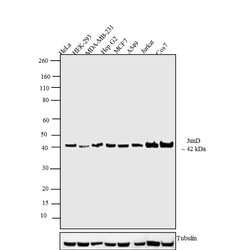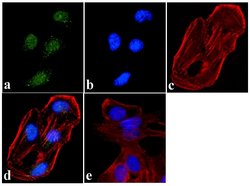Learn More
JunD Recombinant Rabbit Monoclonal Antibody (2H8L8), Invitrogen™
Rabbit Recombinant Monoclonal Antibody
Supplier: Thermo Scientific 701669
Description
This antibody is predicted to react with Dog, Bovine and Pig. Recombinant rabbit monoclonal antibodies are produced using in vitro expression systems. The expression systems are developed by cloning in the specific antibody DNA sequences from immunoreactive rabbits. Then, individual clones are screened to select the best candidates for production. The advantages of using recombinant rabbit monoclonal antibodies include: better specificity and sensitivity, lot-to-lot consistency, animal origin-free formulations, and broader immunoreactivity to diverse targets due to larger rabbit immune repertoire.
JunD Recombinant Monoclonal antibody specifically detects JunD in Human, Non-human Primate samples. It is validated for Immunocytochemistry, Western Blot.
Specifications
| JunD | |
| Recombinant Monoclonal | |
| 0.5 mg/mL | |
| PBS with 0.09% sodium azide; pH 7.2 | |
| P17535 | |
| JUND | |
| 3 synthetic peptides corresponding to human JunD (aa 2-16, 132-149, 299-313) | |
| 100 μg | |
| Primary | |
| Human, Non-human Primate | |
| Antibody | |
| IgG |
| Immunocytochemistry, Western Blot | |
| 2H8L8 | |
| Unconjugated | |
| JUND | |
| activator protein 1; AP1; AP-1; JUN D; jun D proto-oncogene; Jun proto-oncogene related gene d; Jun proto-oncogene related gene d1; Jund; Jun-d; JunD proto-oncogene, AP-1 transcription factor subunit; Jund1; JunD-FL isoform; Oncogene Jun-D; Transcription factor jun-D | |
| Rabbit | |
| Protein A | |
| RUO | |
| 3727 | |
| Store at 4°C short term. For long term storage, store at -20°C, avoiding freeze/thaw cycles. | |
| Liquid |
Safety and Handling
Your input is important to us. Please complete this form to provide feedback related to the content on this product.

